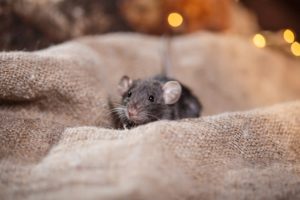 The freezing cold weather of winter forces both humans and animals to retreat to warmer indoor environments. Unfortunately, the warmth, food, and shelter that your home provides can bring unwanted visitors to your doorstep. A mouse only needs an opening the size of a pencil eraser to squeeze into your home. And once inside, mice can cause all kinds of chaos.
The freezing cold weather of winter forces both humans and animals to retreat to warmer indoor environments. Unfortunately, the warmth, food, and shelter that your home provides can bring unwanted visitors to your doorstep. A mouse only needs an opening the size of a pencil eraser to squeeze into your home. And once inside, mice can cause all kinds of chaos.
Although they are tiny, the risk they pose to your home and to your health is great. If you think mice have taken up residence inside your home for the winter, you could soon be facing the following problems — unless you remove your unwanted lodgers as quickly as you can.
1. Mice Spread Disease
Unsurprisingly, mice carry a whole host of diseases and pests that can harm humans. Although you might rarely encounter a mouse face to face, if you touch their fur, feces, saliva, or urine, you could contract salmonellosis, Hantavirus, tularemia, or Listeria.
And mice bring other pests into your home like ticks, fleas and lice, which could attack you and your pets.
2. Mice Damage Your Insulation
During the winter, you rely on your insulation to keep the heat inside your home. But mice are notorious for destroying insulation. They tunnel through, nest inside, and carry off large pieces of insulation. These destructive habits create cold pockets in your walls and attic, which allow warm air to escape from your home.
The longer you leave the problem, the worse the damage will get. In the end, you might have to replace large swathes of insulation.
3. Mice Breed Rapidly
Did you know that mice breed throughout the year, whatever the season? This is especially true if a pair of mice find a warm and cozy place to reside, like your home. A single pair of mice can produce 200 babies in just four months. This means that by spring, you could have a horde of mice wreaking havoc throughout your home.
4. Mice Damage Furniture
As well as your insulation, mice will also nest in items of furniture, such as sofas, armchairs, and even beds. And even if they don’t choose to nest in these items, mice will carry off chunks of furniture to use as bedding inside your walls and in your attic where it is warm.
5. Mice Contaminate Food Supplies
Since mice are so small, they can squeeze into pantries and cupboards effortlessly to raid your stored food supplies. Unfortunately, mice will then contaminate those food supplies with their saliva, feces, and urine. If you eat that food without realizing mice have contaminated it, you could fall ill with a disease like Listeria or Hantavirus.
6. Mice Can Cause Fires
Like all rodents, mice gnaw constantly because their teeth never stop growing. Unfortunately, mice chew on the insulation around electrical wiring, leaving the wires exposed. If an exposed electrical wire overheats, it could then start a fire somewhere inside your home.
7. Mice Can Damage Family Heirlooms and Collectables
If you have some valuable family heirlooms, like antique pictures and furniture, stored in your attic, a family of mice could do a lot of damage to those items. You also need to worry about mouse urine, which could ruin heirlooms and collectibles stored nearby nesting mice.
If you have found mouse droppings or mouse damage in your home, you need the help of a professional pest control service. For over 30 years, Guardian Pest Control has served the Chicagoland area and northwest Indiana. Call our team today, and we’ll remove your mice invaders before they cause you a whole host of winter headaches.
